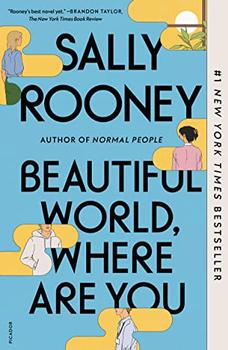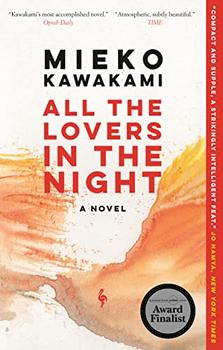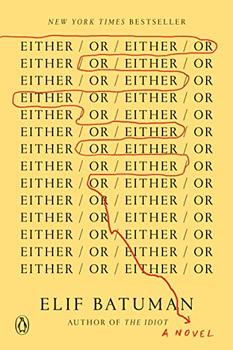Summary | Excerpt | Reading Guide | Reviews | Beyond the book | Read-Alikes | Genres & Themes | Author Bio

Critics' Opinion:
Readers' Opinion:
First Published:
Sep 2021, 368 pages
Paperback:
Jun 2022, 368 pages
 Book Reviewed by:
Book Reviewed by:
Amanda Ellison
Buy This Book
Beautiful World, Where Are You centers around four key characters, the most prominent of which are Eileen and Alice, both in their late 20s, who have been friends since their university days at Trinity College. Since then, their lives have followed very different trajectories: While Eileen works in a low-paid — if enjoyable — job for a Dublin-based literary magazine, Alice has rapidly found fame and fortune as a young novelist, an ascent that has resulted in her hospitalization for burnout and depression. The novel primarily pivots around the relationship between these two young women.
This relationship is complicated by Alice and Eileen's connection with staunch Catholic Simon, who works for the Irish Parliament and becomes increasingly aware of his inability to effect positive social change despite his political insider status. Simon has known Eileen all her life and is five years her senior. The relationship between the two has always been based on a close emotional bond, occasionally veering into something more. Neither, however, verbalizes their true feelings for the other, providing a "will they or won't they" element for the reader. Add to the mix Felix, a warehouse worker who meets Alice on a dating app and happens to live in the coastal town to which she has fled post-breakdown, and the scene is set for the hotbed of insecurities, yearnings and ambiguities that make up Rooney's typical subject matter, as previously explored in Conversations with Friends and the acclaimed Normal People.
The novel's title is posed as a question, yet the omission of the question mark may cause the reader to wonder as to the reason for this. It could suggest that the characters are on some kind of quest to find meaning in their lives; however, the tentative tone of the question indicates that there is no real expectation of an answer. Indeed, the lack of centeredness that young adults face in the early 21st century seems to be a theme that Rooney is examining.
Much of the narrative is epistolary in form, comprised of lengthy email exchanges — whole chapters — between Eileen and Alice. It is through these highly introspective communications that the characters' lack of direction and purpose, as well as their helplessness, are revealed. Very early in the novel, for example, Eileen recounts an episode in a local convenience store, during which it suddenly strikes her that the vast array of choice on offer is a "culmination of all the labor in the world, all the burning of fossil fuels and all the back-breaking work on coffee farms and sugar plantations." She ruminates that this "lifestyle" supported by the world's capitalist enterprises is not even satisfying; it is later noted that much of the modern world, with all its plastic and concrete, is in fact rather ugly. Such political awareness is pronounced in today's young adults, who stand at a unique moment in time wherein many global concerns are made inescapably apparent via mass media. Because of this, Eileen's sense of discontent will strike a chord only too well with contemporary readers, and echoes the sentiments of the novel's title.
Despite their awareness of global crises and injustices, the characters always circle back to the "trivialities" that define their immediate, intimate world. They perceive it as "vulgar, decadent" to invest their efforts in personal relationships while "human civilization is facing collapse." But is it in society where their "beautiful world" can be found? Is this where they will locate their center? After all, public acclaim has brought the economically affluent Alice financial security but no happiness. These are questions with which the characters must grapple as they struggle to reconcile their personal lives with more public concerns.
Rooney speaks to a generation of readers caught up in zeitgeisty dilemmas, much like J.D. Salinger held up a mirror to 1950s America in The Catcher in the Rye. At every turn, the novel confronts familiar features of our time, such as when Eileen reveals that two-thirds of her salary (only 20,000 euros per annum) goes to rent; this will resonate with young workers struggling to make it onto the housing ladder with little hope of a secure future. Such weighty concerns could be deeply depressing (at one point Eileen describes life as "standing in the last lighted room before the apocalypse"), yet Rooney does hint that there is joy to be found — most likely in the realm of the personal.
Rooney connoisseurs will be unfazed by her trademark stylistic practices, including her eschewing of quotation marks in direct speech. She is far from the first writer to reject this convention — among many others, her fellow Dubliner James Joyce completely disregarded the punctuation device. A lack of quotation marks is perhaps consistent with the fluency of communication in all its forms, whether email, direct speech or interior monologue. While it may be a source of irritation to some readers, for Rooney, it seems to reflect a cohesive marriage of style and subject matter. As we observe the relationship between Eileen and Alice imploding and unraveling, we bear witness to how blurred the boundaries of communication have become — but these more "modern" ways of communicating also form the bridge that allows them to rebuild their relationship.
Beautiful World, Where Are You will appeal to anyone interested in the human condition and the psychology of relationships — and it's quite the page-turner too.
![]() This review was originally published in The BookBrowse Review in September 2021, and has been updated for the
June 2022 edition.
Click here to go to this issue.
This review was originally published in The BookBrowse Review in September 2021, and has been updated for the
June 2022 edition.
Click here to go to this issue.

If you liked Beautiful World, Where Are You, try these:

by Mieko Kawakami
Published 2023
Bestselling author of Breasts and Eggs Mieko Kawakami invites readers back into her immediately recognizable fictional world with this new, extraordinary novel and demonstrates yet again why she is one of today's most uncategorizable, insightful, and talented novelists.

by Elif Batuman
Published 2023
From the acclaimed and bestselling author of The Idiot, the continuation of beloved protagonist Selin's quest for self-knowledge, as she travels abroad and tests the limits of her newfound adulthood.





The Flower Sisters
by Michelle Collins Anderson
From the new Fannie Flagg of the Ozarks, a richly-woven story of family, forgiveness, and reinvention.

The House on Biscayne Bay
by Chanel Cleeton
As death stalks a gothic mansion in Miami, the lives of two women intertwine as the past and present collide.

The Funeral Cryer by Wenyan Lu
Debut novelist Wenyan Lu brings us this witty yet profound story about one woman's midlife reawakening in contemporary rural China.
Your guide toexceptional books
BookBrowse seeks out and recommends the best in contemporary fiction and nonfiction—books that not only engage and entertain but also deepen our understanding of ourselves and the world around us.